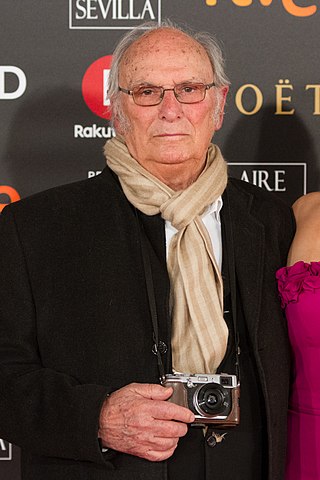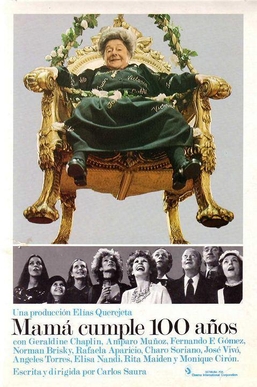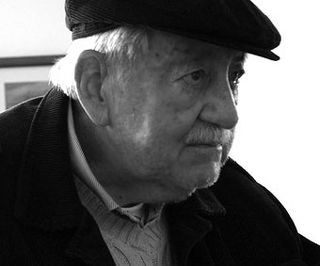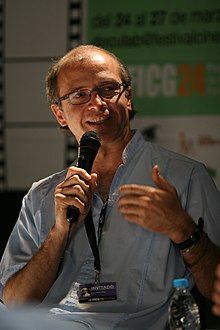
Juan Nepomuceno Carlos Pérez Rulfo Vizcaíno, best known as Juan Rulfo, was a Mexican writer, screenwriter, and photographer. He is best known for two literary works, the 1955 novel Pedro Páramo, and the collection of short stories El Llano en llamas (1953). This collection includes the popular tale "¡Diles que no me maten!".

Mexican cinema dates to the late nineteenth century during the rule of President Porfirio Díaz. Seeing a demonstration of short films in 1896, Díaz immediately saw the importance of documenting his presidency in order to present an ideal image of it. With the outbreak of the Mexican Revolution in 1910, Mexican and foreign makers of silent films seized the opportunity to document its leaders and events. From 1915 onward, Mexican cinema focused on narrative film.

Geraldine Leigh Chaplin is an American actress. She is a daughter of Charlie Chaplin, the first of eight children with his fourth wife, Oona O'Neill. After beginnings in dance and modeling, she turned her attention to acting, and made her English-language acting debut in her portrayal of Tonya in David Lean's Doctor Zhivago (1965). She made her Broadway acting debut in Lillian Hellman's The Little Foxes in 1967, and played the role of ancient Egyptian Queen Nefertiti in Raúl Araiza's Nefertiti and Akhenaton (1973) alongside famous Egyptian actor Salah Zulfikar. Chaplin received her second Golden Globe nomination for Robert Altman's Nashville (1975). She received a BAFTA nomination for her role in Welcome to L.A. (1976). She played her grandmother Hannah Chaplin in the biopic Chaplin (1992) for which she received her third Golden Globe nomination.

Henner Hofmann, AMC, ASC, is a Mexican cinematographer, producer and screenwriter.
Tomás Gutiérrez Alea was a Cuban film director and screenwriter. He wrote and directed more than twenty features, documentaries, and short films, which are known for his sharp insight into post-Revolutionary Cuba, and possess a delicate balance between dedication to the revolution and criticism of the social, economic, and political conditions of the country.

Juan José Arreola Zúñiga was a Mexican writer, academic, and actor. He is considered Mexico's premier experimental short story writer of the 20th century. Arreola is recognized as one of the first Latin American writers to abandon realism; he used elements of fantasy to underscore existentialist and absurdist ideas in his work. Although he is little known outside Mexico, Arreola has served as the literary inspiration for a legion of Mexican writers who have sought to transform their country's realistic literary tradition by introducing elements of magical realism, satire, and allegory. Alongside Jorge Luis Borges, he is considered one of the masters of the hybrid subgenre of the essay-story. Arreola is primarily known for his short stories and he only published one novel, La feria.

Gus Reyes is a Mexican musician and composer focused on film scoring.

Carlos Saura Atarés was a Spanish film director, photographer and writer. Along with Luis Buñuel and Pedro Almodóvar, he is considered to be one of Spain's most renowned filmmakers. He had a long and prolific career that spanned over half a century. His films won many international awards.
In the Pit is a 2006 documentary by Juan Carlos Rulfo. The film won several awards, including the Jury's Prize for Best International Documentary at the Sundance Film Festival. It tells the story of several construction workers in Mexico City involved in the construction of the second story of the Periferico Freeway.
The National School of Film Arts is a public film school part of the National Autonomous University of Mexico in Mexico City. It was influenced by the Nouvelle Vague and by the First Contest of Experimental Film organized in Mexico that year.

Montxo Armendariz is a Spanish film director and screenwriter. His film Las cartas de Alou won at the San Sebastian Film Festival. His next film, Historias del Kronen, was entered into the 1995 Cannes Film Festival. Secretos del corazón won several Goya Awards, the Blue Angel Award at the Berlin Film Festival and received the Academy Award nomination for Best Foreign Film.

Mamá cumple cien años is a 1979 Spanish comedy film written and directed by Carlos Saura. The film is a comedy sequel of the drama Ana and the Wolves directed by Saura in 1973. It was nominated for the Academy Award for Best Foreign Language Film at the 52nd Academy Awards.
Juan Carlos Tabío was a Cuban film director and screenwriter. His film Strawberry and Chocolate (1994), which he co-directed with Tomás Gutiérrez Alea, won a Silver Bear - Special Jury Prize at the 44th Berlin International Film Festival, and was also nominated for the Academy Award for Best Foreign Language Film. He has collaborated with director and close friend Tomás Gutiérrez Alea and actors Jorge Perugorría, Vladimir Cruz and Mirta Ibarra in several films.

Juan Martín Cueva Armijos is an Ecuadorian documentary film director and the director of the Filmfestival "Cero Latitud" in Quito. His documentary film "Where the poles meet" won the Best Documentary at the IX Festival Internacional de Cine de Valdivia in Chile and at the Brouillon d’un reve de la Scam in Paris in 1999.

Agustí Villaronga Riutort was a Spanish film director, screenwriter and actor. He directed several feature films, a documentary, three projects for television and three shorts. His film Moon Child was entered into the 1989 Cannes Film Festival.

Juan Carlos Chirinos García is a Venezuelan writer and creative writing teacher. He is a novelist, story writer and biographer.

Fernando Soto Aparicio was a Colombian poet, storyteller, playwright, novelist, librettist, and screenwriter. He was born in Socha, in the Department of Boyacá. Fernando Soto Aparicio spent his childhood in Santa Rosa de Viterbo. He is remembered for the novel The rebellion of the rats. After several decades as a professor at various universities in the country, in 1961 he was exalted with the prize Selecciones Lengua Española, in 1970 he received the Casa de las Américas Prize, and a year later, the prize City of Murcia. In total, he wrote about 70 literary works, among them novels, poems, books of short stories, as well as theatre plays.

Roma is a 2018 drama film written and directed by Alfonso Cuarón, who also produced, shot, and co-edited it. Set in 1970 and 1971, Roma follows the life of a live-in indigenous (Mixteco) housekeeper of an upper-middle-class Mexican family, as a semi-autobiographical take on Cuarón's upbringing in the Colonia Roma neighborhood of Mexico City. The film stars Yalitza Aparicio and Marina de Tavira in the leading roles. It is an international co-production between Mexico and the United States.

Alejandro García Pérez is one of the most active producers of audiovisual content in the Spanish-speaking Americas. His films have won such prizes as the Golden Bear at the 2008 Berlin Film Festival for Elite Squad, along with a 2015 Emmy nomination for Outstanding Television Movie for the drama Nightingale.

FotoFilm Tijuana is a festival that takes place annually in Tijuana, Baja California, Mexico. It is a photography and film festival and had over 22,000 attendees in 2017. Held in July at the Tijuana Cultural Center, the event is a showcase for Mexican and international filmmakers, photographers and performers. The festival comprises competitive sections for short films, and includes feature films and documentary films.
















